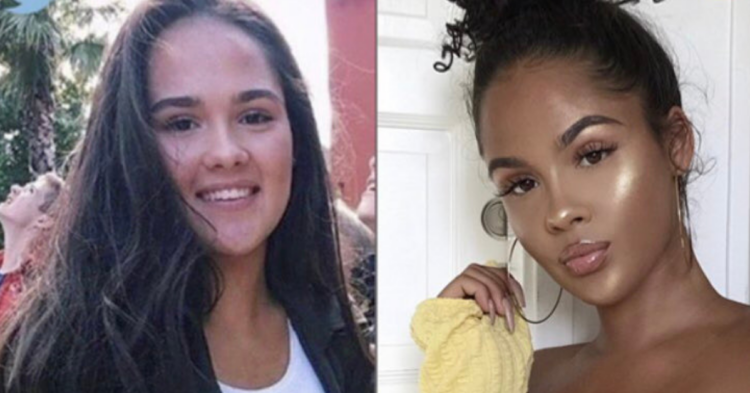One of the things we love most about using the internet is that it allows us to live beyond our regular, boring lives. To a degree, we can be who we want to be, rather than who we know we are. I mean, let’s face it, haven’t we all posted a profile pic that has perfect lighting and shows us at our most flattering and least normal?
And that’s also one of the things that makes being on the internet so frustrating, that divide between what’s online and what’s IRL. Because you never know when someone else might be idealizing themselves — or even what their notion of ideal might be.
We might think we’re just posting a nice, flattering pic, but on a first date, that can turn into an accusation of catfishing. What a minefield it can be. And then there’s a whole new matter online: Blackfishing.
Emma Hallberg is a 19-year-old Instagram model from Sweden with 270,000 followers.

She’s young, successful, and at the center of an online firestorm about “blackfishing’ — pretending to be black, going to lengths to darken your skin, often to gain social media followers.
Of course, Emma denies that she does anything purposefully to appear black.

Although an older photo going around the internet shows her with much lighter skin, she says “I haven’t done anything to make myself look darker. I get the tan naturally when I’ve been in the sun.”
She also maintains that she has never claimed to be black or biracial and that her looks are natural.

“I cannot change the way I was born because the things I’ve been accused of and the things people are mad about are things that are natural for me, like my hair, my lips, my nose, my face,” Emma said .
Emma’s not the only one who has been accused of blackfishing.

Aga Brzostowska, a 20-year-old Instagrammer with 24,000 followers has heard similar accusations after tanning. “With things like tanning, I don’t think I’ve done anything in a malicious way,” she told the BBC. “I’m proud to be Polish but I don’t know why I look like this — my features are just there. I can’t help that I have big lips and not the stereotypical Polish features.”
The whole idea of blackfishing came to light after a Twitter thread by writer Wanna Thompson.

She called out all the “white girls cosplaying as black women on Instagram.” However, she didn’t have a quite as diplomatic a name for it as “blackfishing,” and she encouraged her followers to share examples.
For Wanna and many others, blackfishing is a big, big deal.

As Dara Thurmond told the BBC, for black people, “just being ourselves” has “always been frowned upon…Even in certain work spaces, black women can’t wear their natural hair out. They have to wear weave. They have to press their hair so that it’s straight, because to wear an afro or to wear braids or to wear locks is seen as unclean or untidy — it’s not professional.”
Many people have pointed out the particularly troubling aspect of blackfishing among Instagram influencers.

Basically, they’re taking the opportunities for promotions and profits away from actual people of color. Not to mention the comparisons to blackface, only “pretty.” And the fact that people who only look black on social media don’t really have to deal with everything else that comes with being black or have to speak out for the black community.
Not everybody views it through a completely negative light, however.

Some see a compliment in it. Or, at the very least, they don’t see anything wrong with people being who they want to be and doing what they want to do with their own bodies.
And as at least one person noted, much of the controversy comes from the constantly moving goal posts for beauty standards.

As the world gets more and more connected, beauty standards from Asia are going to run up against beauty standards from South America, and Europe, and North America, and Africa, and the Caribbean, and on and on and on.
And others encourage anyone blackfishing to simply embrace their own beauty.

I mean, it’s never a bad call to be your own, beautiful self! At the end of the day, honesty is always the best policy.

















































